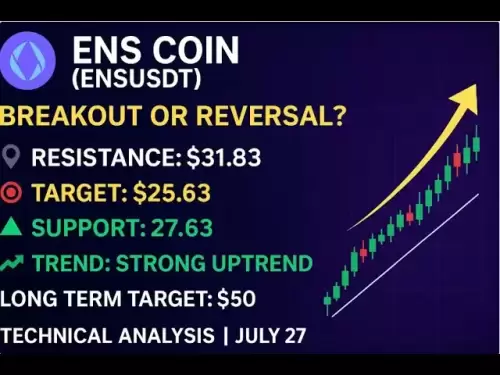 |
|
 |
|
 |
|
 |
|
 |
|
 |
|
 |
|
 |
|
 |
|
 |
|
 |
|
 |
|
 |
|
 |
|
 |
|
Cryptocurrency News Articles
Hayden Davis's LIBRA Token: From Investment Promise to Memecoin Mayhem
Jul 28, 2025 at 04:00 am
Hayden Davis's LIBRA token saga unfolds: from Javier Milei's promotion to a memecoin admission amid legal battles and frozen assets.

Alright, crypto aficionados, buckle up! The wild ride of Hayden Davis and his LIBRA token just keeps getting crazier. What started as a supposed investment fund for Argentine businesses has now been dubbed a memecoin in court. Let's dive into the drama.
The LIBRA Token's Rollercoaster
Remember when Argentine President Javier Milei was all over X (formerly Twitter), hyping up the LIBRA token back in February 2025? Well, things took a turn faster than a New York minute. The token skyrocketed to $5 before crashing harder than a Wall Street rookie during a market correction. Now, Milei's distancing himself faster than you can say 'rug pull,' even authorizing an investigation.
Hayden Davis's Memecoin Confession
In a recent court filing, Davis admitted that LIBRA was essentially a memecoin. This revelation came as part of his defense against a class-action lawsuit led by U.S. investor Omar Hurlock. Hurlock claims he was scammed, but Davis is fighting back, arguing that Hurlock hasn't proven he even bought the tokens directly from Davis or his team.
Davis's legal team is doubling down, asserting that LIBRA had no real business setup, strategies, or tokenomics. They're calling it a 'hyper-risky, hyper-speculative digital collectible with no intrinsic value.' Ouch! That's a far cry from the initial promises of funding small businesses in Argentina, wouldn't you say?
Political Intrigue and Suspicious Transfers
But wait, there's more! Just as Davis met with President Milei in January, wallets linked to Davis allegedly sent hundreds of thousands of USDC to crypto exchanges like Kraken and Bitget. Coincidence? Maybe. Fishy? Definitely. These transactions are now under scrutiny, adding another layer of complexity to the LIBRA saga.
Legal Battles and Frozen Assets
The legal drama is unfolding in the Southern District of New York, with a key hearing scheduled for August 19. Judge Jennifer L. Rochon will preside over the case, where Davis, along with Benjamin Chow of Meteora and Julian Peh of Kip Protocol, will have to answer for their involvement. And let's not forget the $280 million in frozen assets linked to the LIBRA project – that's a whole lotta moolah hanging in the balance.
What Does This Mean for Memecoins?
Davis's defense – that LIBRA was just a memecoin – could have serious implications for how risky crypto tokens are handled in future fraud suits. It raises questions about the responsibilities of creators when launching these projects and how they're regulated. Transparency and governance are no longer optional; they're essential for survival in the crypto jungle.
Final Thoughts: A Cautionary Tale
The LIBRA token story is a stark reminder of the risks involved in investing in hype-driven crypto assets. It's a wild west out there, and investors need to stay informed and cautious. As the legal spotlight intensifies, the future of meme-driven tokens hinges on their ability to navigate shifting regulatory standards and maintain investor confidence.
So, what's the takeaway? Don't believe the hype! Do your research, and remember, if it sounds too good to be true, it probably is. The crypto world is full of surprises, but sometimes, those surprises come with a hefty price tag. Stay safe, stay savvy, and may your portfolio always be in the green!
Disclaimer:info@kdj.com
The information provided is not trading advice. kdj.com does not assume any responsibility for any investments made based on the information provided in this article. Cryptocurrencies are highly volatile and it is highly recommended that you invest with caution after thorough research!
If you believe that the content used on this website infringes your copyright, please contact us immediately (info@kdj.com) and we will delete it promptly.





























































